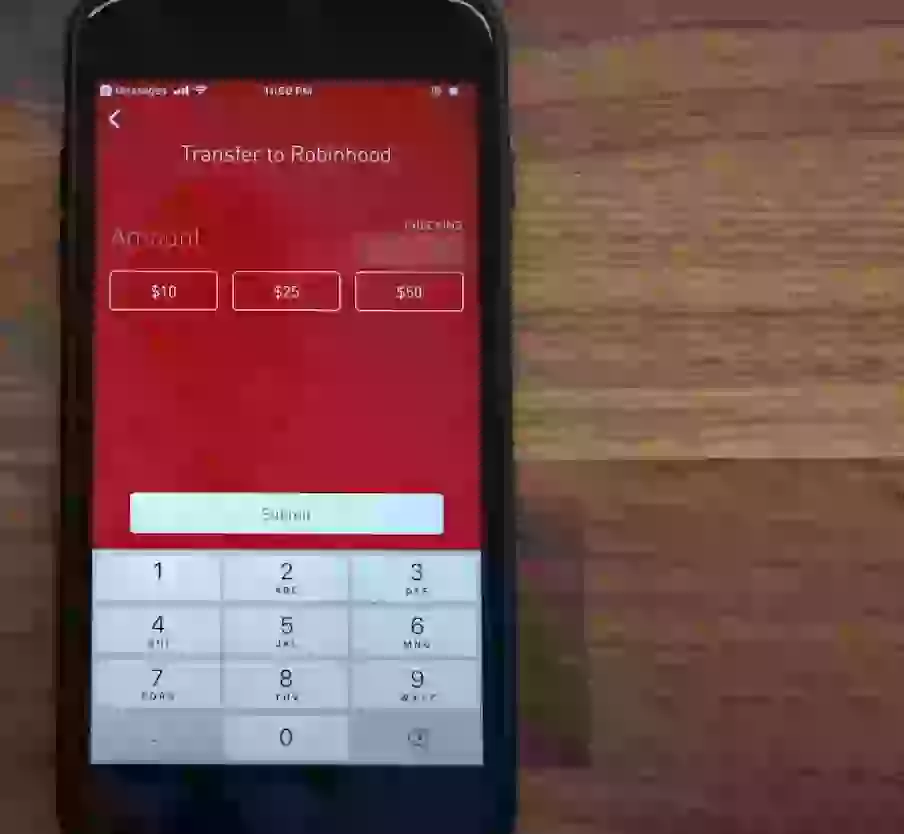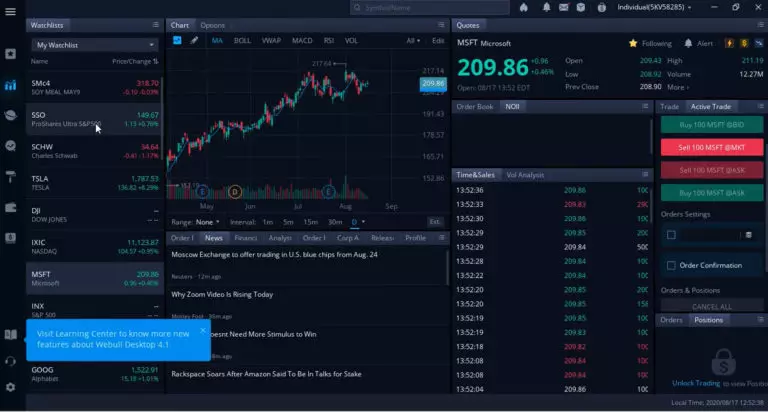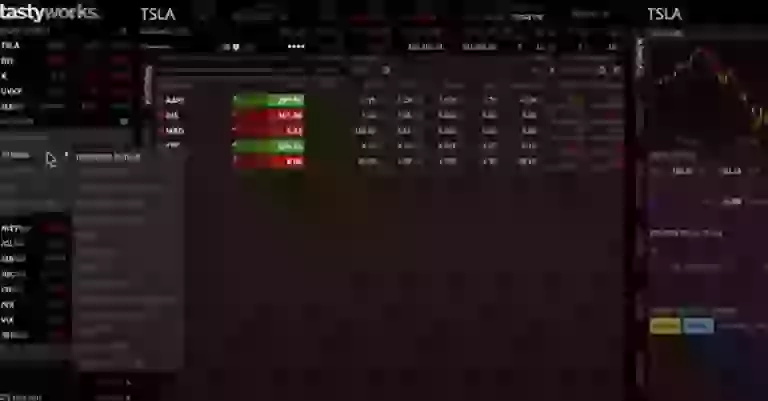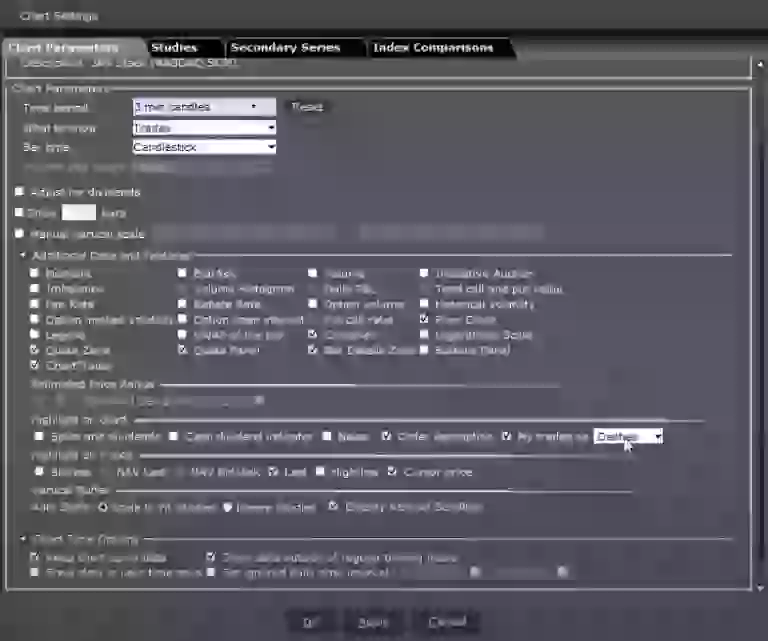Robinhood
Robinhood Review
Robinhood is for us the best brokerage service for beginners (10) in online trading (1) despite being relatively new in the market (8). Once again this year we consider that Robinhood and their premium program Robinhood Gold represent the best option for a beginner who is looking for a broker to start investing online (2) (11) thanks to its minimalistic design (9). We have to say that Robinhood is a regulated company and controlled and monitored very closely (4) by federal agencies in the United States (5). These agencies are the federal authorities that monitor the securities market and the financial industry (3). We refer to the Securities and Exchange Commission called SEC (6) and FINRA, which is the financial industry regulatory authority (7).
Pros And Cons Of Robinhood
Robinhood is absolutely commission-free. It does not have any kind of direct fees and it does not have any indirect fees for maintenance fees withdrawal fees or inactivity fees of any kind.
We can say that the trading platform is one of the most accessible for beginners because of its simplicity and minimalistic design. The screens are not cluttered with information.
However, we have to say that as some of the competitors like Webull, Firstrade, and Tastyworks, Robinhood’s focus is in the United States markets only.
Robinhood does not offer a huge product range. Therefore, it is not a recommended option for experienced investors or for corporations that require a brokerage service to diversify their investment portfolio through trading operations.

Structure of fees
There are absolutely no fees in Robinhood. No direct trading fees and no indirect trading fees.
When we evaluate the fee structure we always consider two categories: direct fees and indirect fees.
In the direct fees, we include all the ones that I related to a specific operation. The most common of them are commissions in the cases where each time you perform an operation there is a commission. Another example is the spreads and also we have to include the overnight rates or financing rates that you are obliged to pay for margin operations.
The indirect trading fees are those fees that are not related to a specific trading operation. In this, we include fees for the inactivity of the account like payments you have to do when the account is dormant and this is something that exists for example in Firstrade as well.
Examples of indirect fees are the fees that have to be paid monthly as a monthly maintenance fee or annual maintenance fee and finally, we have to include withdrawal fees. These withdrawal fees are very common with brokers and those are the ones you have to pay when you do a transfer between your account with the broker to your bank or financial institution.
In the case of Robinhood, there are no fees for operations with US stocks and ETF’s. There are also no fees for operating with foreign stocks through American depositary receipts or ADR.
There are no commissions when you have to operate with options, no commissions for operations with cryptocurrencies, free commissions for everything.

For margin operations, there is a payment to be done. But this payment is not actually a commission but is the payment of financing rate to the broker. This overnight rate has to be paid to the broker when you operate on margin or when you short a stock.
This is because when you operate in this way when you trade on margin, you are borrowing money from your broker. This is a loan and. Always for a loan, you have to pay an interest rate. This is what we call the financing rate or overnight rate and in Robinhood, it is 5%.
This financing rate in Robinhood is very low because in other companies like Webull or Ameritrade you have to pay 7% and 10.3% respectively. Therefore, 5% is the lowest interest rate for trading on margin of all the brokers.
The opening of an account in Robinhood will be studied also later below.
XXXXX
Robinhood Review 2020: Pros, Cons & How It Compares
I’ve been trading stocks with the Robinhood app for over seven months now so I just thought that I could do an honest review for you. With this Robinhood review, you can decide for yourself whether it is something that you want to use or not.
I’ll cover everything on the stock trading side of the app and then I’ll provide you all the pros and the cons of Robinhood so it is totally an honest review as the information provided are actual facts.
Now let’s just start talking about the Robinhood app if you’re not too familiar with Robinhood they’re not just another brokerage account.
Now Robinhood captures a lot of attention because it is completely free: $0 commission, $0 minimum account balance, so you could literally open up an account, fund it with $10 and start investing in stocks. However, currently, also the Robinhood competition such as Merrill and Ameritrade are offering free trading operations, this broker still has a powerful advantage because you can trade cryptocurrency without commissions and their trading dashboard is smooth and streamlined. The latter is an advantage for investors that want to close operations quickly and for ambitious beginners.
So there’s a lot of appeal to this, but what I really want to make sure the investors that are reading this understand in this Robinhood review, is that it is a very limited platform and that’s kind of what we’re gonna get into here are the pros and the cons of this platform, why I like this platform, and also why I’m not such a fan of this platform at the same time.
Robinhood Review: The Bottom Line
First of all, let’s talk about what Robinhood actually is. Robinhood is a free-trading app out there that has really ballooned in popularity.
It allows you to invest in stocks, ETFs, as well as for cryptocurrencies and options. Now the cryptocurrency piece is still limited to certain states in the United States, so if you are looking to invest in cryptocurrency through Robinhood, you’re going to want to make sure
it is currently available in your state.
Beyond that, Robinhood is a very basic investment platform. It is a 100% online platform,
meaning there are no physical storefront locations. So I’m sure you guys have seen the Charles Schwab or Fidelity locations around where you can go to a branch office
or you can call someone up on the phone.
With Robinhood, it is completely electronic and online and so this right here might be a con for some people, the fact that you can’t call someone up on the phone or you can’t stop into a branch location to talk to someone but really, the difference here is the fact that you’re not paying anything either as a commission or as maintenance of the account.
With the traditional online discount brokers you’re paying a fee for commission and they have a minimum account balance that is more or less what Robinhood eliminated. However, by eliminating that fee structure they are not able to offer the personal attention that you might get through your other brokerage account where you can call someone on the phone
or stop into a branch location and enjoy a personalized customer service
So what can you invest in using the Robinhood app? First of all, you can invest in publicly traded stocks or ETFs on the New York Stock Exchange or the Nasdaq. Therefore, right off the bat, that tells you that you cannot invest in penny stocks, you cannot invest in foreign stocks unless they trade through ADRs, and you cannot invest in stocks on the over-the-counter exchanges.
You can also invest in cryptocurrency, without commissions, through the Robinhood app if it is available in your state and currently this includes Bitcoin, Bitcoin Cash, Dogecoin, Ethereum, Ethereum Classic, and Litecoin. Robinhood plans to have this deployed all over the US. Check your state and see if it is available there.
Robinhood also now allows you to buy and sell options free of charge. So what this means is that there are no mutual funds available on Robinhood and there are no penny stocks or over-the-counter stocks.
Requirements To Open An Account In Robinhood
What are the fees associated with a Robinhood account, and what are the requirements?
Well, the only requirements are that you do have to be a US investor, 18 and up, but beyond that, there are no fees associated with Robinhood.
It is completely free, with no minimum account balance, and no commission cost for trading.
Robinhood Review: Pros And Cons
Pros
Okay, so what are the pros of this platform? There are pretty much two of them that I see.
Completely free: No Barriers To Entry In Investing
100% free: First of all, it’s 100% free, which really lowers the barriers to entry to get started with investing. Traditionally if you wanted to open an investing account, it might be a $500 or $1000 minimum balance but with Robinhood, it is $0, you can get started with pretty much nothing.
In the comments, one user of Alabama with 19 years old could start operating with twenty dollars. It is easier and provides a faster ROI than other brokers where you already are paying commissions for the operations.
The big reason that they’re so popular is that they do not charge any trading fees which is a big deal because with most brokerages you’ve got to pay at least about six to ten dollars every time you buy or sell stocks. This looks just like a waste of money.
Therefore, so if you bought just one share of a company for a hundred bucks then you’d have to pay the commission right now, and then you would have to pay the commission again when you sell the stock. I mean, paying a commission isn’t that big of a deal when you’re buying a thousand shares at once because you’re only going to be charged the commission based on the transaction and not on a per-share basis.
But because Robinhood doesn’t charge any fees it’s a lot easier for a beginner to start investing because he can just buy one share for about ten dollars and then he doesn’t have to pay a commission, which is a lot better for him to actually get started they don’t require a minimum balance to get started investing so technically you could start investing with RobinHood with any amount of money.
Streamlined Dashboard And Interface Application
Simple interface: The second pro for them is the fact that it has a very simple interface
pretty much anybody can jump on there, get started, and understand what it is they are doing but that in and of itself is also a con because the platform is extremely basic. And for any investor out there that’s really doing a lot of research. You are going to be extremely limited by this platform.
Tradable Securities
Regarding the offer of products, as of now, they offer all the major stocks ETFs REITs and they have free cryptocurrency trading and free options trading as well.
You can invest in publicly traded stocks or ETFs on the New York Stock Exchange or the Nasdaq.
In the past, you could only purchase whole shares of stock, so there are no fractional or partial shares available. And one platform that does offer both of these things, they offer a DRIP and they also offer fractional shares is M1 Finance, this is also a completely free platform and I have reviewed it thoroughly with a good result in my evaluation.
However, now Robinhood offers to possibility to acquire fractional shares. You would be paying, so to say, just one dollar for a small portion of a share, even if the price of that share is of a couple of thousands of dollars. This feature is also included with Charles Schwab and Interactive Brokers.
We like to have this ability. You may position yourself with a quite diversified stock of shares in your portfolio, allowing you to purchase a plethora of other fractional shares even if you are not in a position to perform a huge investment of money.
Now if you’re new to Robinhood using this link, it will provide me and you a free stock just for signing up. If that’s something you’re interested in it’s a cool incentive because once your account signed up you can use the referral link as well and you can get free shares from all the people that you refer to.
Let me be honest, I’ve never received a free share that’s worth more than ten dollars bucks but maybe you’ll be one of the few people that actually get lucky and get a good one. Some people in the comments received shares for more than ten dollars after they have signed up.
Very versatile: Accessible Through Desktop And Mobile Application
Now as far as the platform goes, and I cannot ignore it in this Robinhood review, is that it started out as an app only, but since 2020 it is offered on desktop. Therefore if you like to do your investments on your desktop computer, then you can definitely do that.
Robinhood Cons
Limited Platform: But Streamlined Enough For Smart Investors Who Perform Quick Operations
So that right there is the first con I see for Robinhood. That platform is extremely basic
and I have used Robinhood before. I still have some investments with Robinhood but what I would find is I was doing all of my investment research on other platforms
and on this website.
It is fine if you come to this website or somewhere else to do your research and then you move to Robinhood dashboard to perform the actual operations as Robinhood does not have all the bells and whistles of other brokers.
I was only using Robinhood to buy and sell my shares and I really would rather have the ability to do that all in one place where I’m on an app that allows me to do research and learn about investments and then perform my transactions as well.
Limited Securities: No mutual funds or bonds
Another aspect against Robinhood for some investors is the fact that Robinhood does not offer mutual funds so if you are looking to invest in mutual funds you are not going to be able to do that through Robinhood.
For investments in mutual funds, the best brokerage service is Firstrade, wherein you have a portfolio of more than four hundred to browse.
No retirement accounts
Now a big con is the fact that they do not offer retirement accounts and this right here is a huge problem in my opinion because you cannot open any type of retirement accounts.
You can’t do the self-directed Roth IRA or a traditional IRA through Robinhood and I think a lot of people do not understand the difference here between investing through a retirement account where you can be tax-sheltered or investing through a traditional brokerage account where you’re paying taxes and you’re paying at the maximum rate in some cases.
So really educate yourself on investing through retirement accounts if you are a long-term investor, especially as a young person, and make an effort to understand the advantage of investing and being able to do so through a retirement account.
This means that if you are looking to open up any retirement accounts like Roth IRAs or IRAs then definitely you cannot do it with Robinhood. This is because as of now, they do not have any tax-sheltered accounts so just don’t even bother with that kind of accounts so just plan on using Robinhood for all the different types of investments that don’t involve a retirement account.
Another con is that there are no pre-built portfolios with Robinhood, so you can’t really go on there and start investing in a portfolio that was built by somebody else. They’re putting all of that power in your hands to decide what you’re going to be investing in and you also really can’t build a portfolio or automate that process at all.
If you are into social trading the best brokerage service is Tastyworks. There, in the dashboard, you can view the top traders categorized by their level of expertise. Pick one of their traders, and duplicate (copy and paste, so to say) his operations.
No Dividend Reinvestment Plans
Another con is that Robinhood does not offer a DRIP or dividend reinvestment plan. A lot of other brokerage accounts out there allow you to reinvest your dividends automatically and Robinhood does not do this.
No Automation Of Investments: Very manual
You can’t automate deposits into your account, you can’t automate investments. Really, it’s as basic as it gets here with this Robinhood platform, and that is the advantages that some
of these other platforms offer out there, it’s the fact that you can automate your contributions or automate your investments, or automatically reinvest those dividends
that are paid out by the stocks you’re investing in.
If you plan on doing any type of automated investing where you don’t have to do much at all don’t use Robinhood for these kind of operations because as of now everything is fully manual with them and that’s just how it is.
Robinhood only offers very basic order types. If you are somebody who’s looking for the more complex order types, you’re gonna wanna look somewhere else but for the most part, these order types are all you would need as a beginner
Not Many Research Options Without The Gold Package
If you are also interested in researching individual companies Robinhood gives you a tiny bit of information but not very much. For more information, you would have to move to Robinhood Gold.
They do at least give you a one to five-year history the p/e ratio and then dividend yields but as far as financials go you’re gonna have to go elsewhere to find that type of information but if you do end up leaving Robinhood to find out more about a company I’d recommend checking our website or Yahoo Finance because they have really good information on dividend history company’s financials and a whole bunch of other stuff that Robinhood does not have.

How Does Robinhood Compare With Other Brokers?
If you are on the fence between Robinhood and maybe something else, I would highly recommend taking a look at Firstrade or Tastworks, unless you are a beginner or an intermediate investor.
For beginners, I will recommend you to stay in Robinhood and start there.
For Whom Is Robinhood A Good Platform?
Moving on for whom is Robinhood a good broker and who is it not for, let´s see.
Robinhood is a good platform for beginners who are looking for a very basic investment platform but as I said, I would recommend doing your due diligence looking around at a couple of different platforms.
Also, it is good for investors that already arranged a portfolio and have a strategy under execution, they just want a streamlined platform as they do research elsewhere. However, these investors normally automatize their processes and they will not enjoy these automation opportunities in Robinhood.
Who is Robinhood Not For?
It is really not good for the research-oriented investor. If you’re looking for candlestick charts, if you’re looking for more information about companies, if you’re looking to do fundamental analysis, you really can’t do any of that here with the Robinhood app.
You’re going to have to do that on different platforms and you’re probably going to be disappointed with that very basic platform.
But understand that is what Robinhood was built for, it was meant to be the most basic
and simple investing platform out there. So I’m really not saying it’s a bad platform, it was just built to be very basic for beginners and if you’re a little bit more advanced as far as investing goes, then you’re probably not going to be happy with Robinhood.
How Does Robinhood Make Money?
You might be asking yourself, well how does Robinhood make money? If they are into zero-commissions, so how does Robinhood make money.
What Robinhood does to make money is that they offer a feature called Robinhood Gold, where you are offered margin, you can buy stocks on margin, and you can also have after-hours or extended hours trading and you also have the availability to have an instant settlement with your funds rather than waiting for funds settlement when you are selling your position.
Typically you would have to wait for those funds to settle to withdraw them or to reinvest them, but Robinhood can offer that instant settlement with their Gold Package. So that is how Robinhood is actually making money.
Now let´s study below their Gold package. For only five dollars, it offers you many more options.
Robinhood Gold
Robinhood also has a premium subscription service called Robinhood Gold that costs five dollars a month but they do give you quite a few features that I’ll list right here.
From my understanding, this is a really good offer. These features are brand new to Robinhood Gold and you will obtain access to premium research articles level to market data higher instant deposits and margin trading for only five dollars a month.
If you’re subscribed to Robinhood Gold and you want to use margin trading they will let you borrow up to $1,000 interest-free, but anything after that is going to be at 5% interest as of right now trading with margin is something that I don’t recommend that most investors mess around with but if you are going down that route then Robinhood does have some pretty competitive rates.
I mean there’s already plenty of risks when it comes to investing so if you’re planning on doing margin trading and something goes bad in the market then it’s only going to compound your problems because of the borrowed money.
Robinhood has also been working on what they call a cash management account which is basically just a savings account but so far they’re advertising that it’s looking to be about 3 percent interest which is really good.
Another really cool feature about Robinhood is that you’ll actually have instant access to your deposits as long as it’s less than a thousand dollars and this is really handy because if the market crashed today and you wanted to quickly move on some stocks then you couldn’t do that unless you actually have the cash waiting. However, with this feature, you can do it up to a hundred dollars.
Actually, that’s retrieving the money instantly as long as it’s less than a thousand dollars and the reason that you generally don’t have access to your money instantly is that banks take three days to transfer that money.
So, if you wanted to buy a share right now you generally can’t do that because you are required to wait the three days. But because of the instant deposit feature from Robinhood, you can get those funds instantly as long as you’re in good standing with your bank getting the money to Robinhood.
Understand that it’s not like you can just deposit seven hundred dollars to Robinhood when you don’t even have the money in your bank account, to begin with.
Likewise, you have access to the same feature if you sell shares with Robinhood because generally, you have to wait three trading days to get your money but with Robinhood, you’re gonna have instant access to those funds so that you can invest in something else as quickly as you want now.
Just keep in mind though, that if you want to withdraw money from Robinhood you are gonna have to wait three trading days because legally that’s the way that it works and you can’t do anything about it. This means that overall, the instant deposit features pretty cool if you’re working with money that’s less than a thousand dollars.
Nevertheless, if you are a Robinhood Gold member you can up that all the way to fifty thousand dollars as long as your account has that same amount in it Robinhood.
Also, Robinhood Gold has a few different order types that you can choose from when you’re trading stocks so just be aware that you don’t have to buy everything at market value and that’s a good thing and then if you’re ever browsing around Robinhood they also have a ton of different articles that you can read based on the stocks that you’re following.
Conclusions
At the end of the day, my overall experience with Robinhood has been really good because it’s a really simple platform to understand and it’s really good for beginner investors they’re definitely not for everybody but in my experience, Robinhood has changed the industry with their free trades and they only keep getting better now.
If you guys are curious about different investing platforms out there and you’re doing your research, I’ve linked up to all the different reviews that we have done so far.
As far as this review goes, I would say that RobinHood is definitely a good platform to use if you’re a beginner or an intermediate investor. I say this because it’s a great place to buy individual shares but if you’re looking for fancy features like a drip on your dividends or fractional share trading, then Robinhood is not the place to be.
However, if you just want to make easy and simple trades that are commissions free then I would definitely consider using them.
So I do encourage you to shop around, look at the different options out there, and really consider the features and benefits of each investing platform and then figuring out which one really best suits your needs.
Further Readings
We have many reviews of different brokers. From all of those, we would recommend a few that we find are suitable for beginners and intermediate investors so you do not have to read more than twenty reviews: Robinhood, Tastyworks, Firstrade, Interactive Brokers, and Webull.
We also have studied investments like the purchasing of residential whole loans, where you buy an entire loan and not a securitized financial product.
Investments in mortgage notes can be done using two platforms that we have reviewed briefly, such as FCI Exchange and Bank Prospector.

I am David, economist, originally from Britain, and studied in Germany and Canada. I am now living in the United States. I have a house in Ontario, but I actually never go. I wrote some books about sovereign debt, and mortgage loans. I am currently retired and dedicate most of my time to fishing. There were many topics in personal finances that have currently changed and other that I have never published before. So now in Business Finance, I found the opportunity to do so. Please let me know in the comments section which are your thoughts. Thank you and have a happy reading.







